Brits are digesting the impact of Keir Starmer‘s trade deal with the US today as figures show it only covers around a quarter of UK exports.
The pact theatrically announced by the PM and US president last night will cut tariffs from 25 per cent to 10 per cent for the first 100,000 cars sent to America.
Levies on steel exports will also be slashed from 25 per cent to zero, in return for concessions such as cutting tariffs on US cars and farmers getting more access to British markets. In a round of interviews this morning, Treasury minister Darren Jones insisted 150,000 workers would be ‘relieved’ that their jobs were no longer at risk.
However, the pact still leaves tariffs higher than before Mr Trump kicked off his extraordinary trade war.
Analysis by Sky News suggests that of the £273billion of exports to the States over the past five years, barely a quarter would be affected by the agreement – with the rest facing the 10 per cent ‘baseline’ charge.
That also assumes the critical pharma sector, accounting for £25.2billion of the total over the period, secures an exemption from Mr Trump’s next wave of tariffs – which appears far from certain.
The agreement did not include any provision for the UK film industry, after the president threatened 100 per cent levies on foreign-made movies.
And Sir Keir admitted this afternoon that the US has not given up on helping tech giants by watering down the Digital Service Tax.
A fact sheet issued by Mr Trump’s trade representative said: ‘The United States is disappointed that the UK was unwilling to agree to fully address its discriminatory Digital Services Tax… It is discriminatory, unjustified, and should be removed promptly.’
Mr Jones told the BBC on the absence of terms on pharma and films: ‘The nothing is good news… those tariffs have not come forward.’
In other developments today:
- British Airways’ parent company has announced it is buying 32 new Boeing planes from the US, in a move that was flagged by the US Commerce Secretary last night;
- Bank of England governor Andrew Bailey has insisted the UK must now ‘rebuild’ trade relations with the EU, amid Tory warnings over Sir Keir’s Brexit ‘reset’;
- The UK steel industry has said it is still not clear what the new tariffs will be or when they will come into effect;
- Ministers have denied that Mr Trump has been handed a ‘veto’ over Chinese investment in UK;
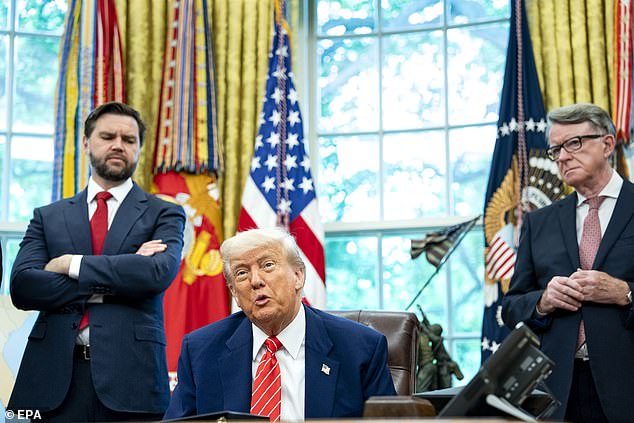
The pact theatrically announced by the PM and Donald Trump (pictured) will cut tariffs from 25 per cent to 10 per cent for the first 100,000 cars sent to America
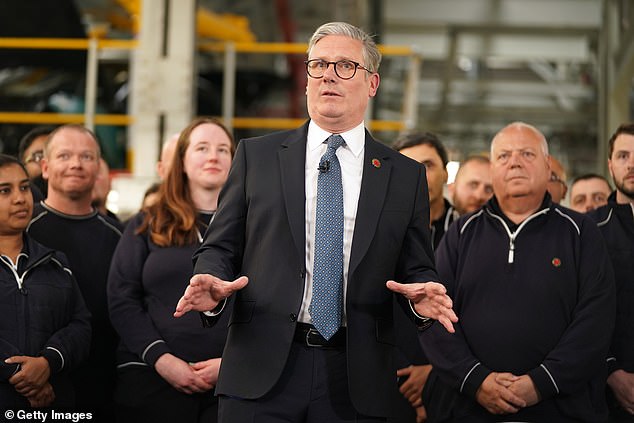
Keir Starmer went to the JLR plant in Solihull to announce the agreement yesterday
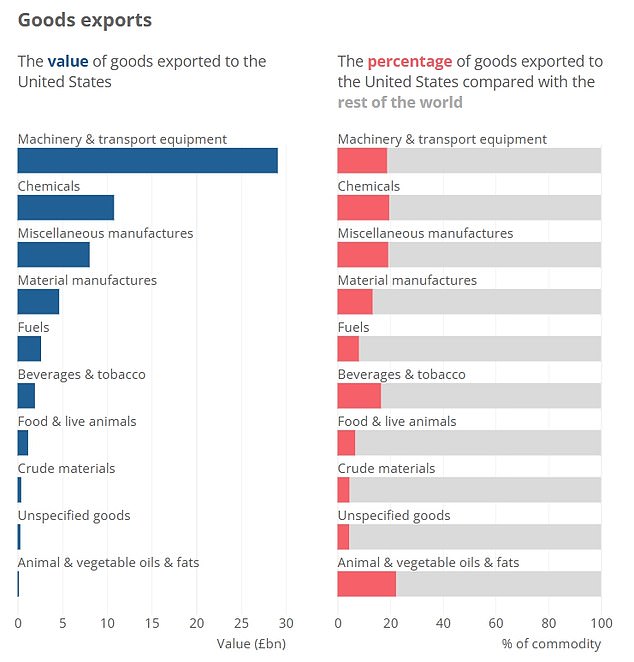
Overall trade in goods between the US and UK is largely balanced, with £59.3billion exported to the US and £57.1billion imported
The deal was the first struck by the US since Mr Trump’s so-called ‘Liberation Day’ tariffs stunned the world.
Ministers had feared that leading car makers were preparing to cut thousands of jobs unless the tariffs were reduced.
Sources said Jaguar Land Rover had been poised to announce ‘hundreds’ of job losses as early as next week.
Challenged that the UK was in a worse place than before Mr Trump imposed sweeping tariffs, the Mr Jones told Times Radio: ‘The counterfactual is the world that we live in, not the world that we would like it to be. In relation to the world that we live in, this is a really good deal for Britain.
‘We are the first country in the world to be able to negotiate an agreement with the President of the United States to move away from those increased tariffs on global trade.
‘And that’s something to be celebrated for the UK economy and for workers that work in those sectors.’
Mr Jones told the BBC: ‘If I could rather be in a world where there were no tariffs, of course I would. But that’s just not the world that exists. So it’s not really an option on the table. The option on the table is to have not signed a trade deal with the United States and had higher tariffs, or to have signed a trade deal with the United States and had lower tariffs.
‘We’ve signed that trade deal. We’ve got lower tariffs in critical manufacturing sectors in the UK. 150,000 people’s livelihoods that we’ve protected as a consequence of that trade deal. That is, by definition, factually better off as a consequence of the action that this Government is taking to stand up for working people across the UK.’
Mr Trump said the speed of the deal with the UK was only possible because of Britain’s status outside the EU.
And he hinted that rival car manufacturers in EU countries such as Germany are very unlikely to get a similar deal.
Ministers failed to make any progress on reducing the 10 per cent ‘baseline’ tariff on all exports to the US.
Britain also seemingly agreed to prevent cheap Chinese steel and pharmaceuticals being routed through the UK to America as a ‘security of supply’ measure.
The White House said that, compared to the position before Liberation Day, overall US tariffs on British goods had still risen from 3.4 per cent to 10 per cent, while Sir Keir had agreed to cut tariffs on US goods from 5.1 per cent to 1.8.
Speaking to broadcasters on board HMS St Albans during a visit to Norway this afternoon, Sir Keir stressed the deal did not cover the Digital Services Tax.
‘On digital services, there are ongoing discussions, obviously, on other aspects of the deal, but the important thing to focus on yesterday is the sectors that are now protected that the day before yesterday were very exposed,’ he said.
The director general of UK Steel, Gareth Stace, told Times Radio: ‘The headline here is that we’re really pleased with Government’s negotiations ability to scrap that 25 per cent tariff burden that we have suffered since March. But yes, we don’t know the details.
‘We don’t know when this deal comes into force for steel, we don’t know what conditions we need to meet in order to remove the 25 per cent tariff, and we don’t know, crucially also, if all steel producers that export to the US market will be included or excluded.
‘There may be issues around ownership, around where the steel is made, and until we see those details, we don’t know whether this heavy burden will be lifted from us.’
Mr Stace said reports that British Steel was more likely to be nationalised after the deal ‘would be a good thing’ on a temporary basis to drive investment across the sector.
Kemi Badenoch said Britain had been ‘shafted’ by the deal. ”We cut our tariffs – America tripled theirs,’ she said.
Boris Johnson hailed the importance of Brexit – highlighting the irony that Sir Keir was ‘reaping the dividends of that policy, which he, of course, singularly failed to support at the time’.
Other Tories criticised the agreement for not going far enough.
Shadow business secretary Andrew Griffith told BBC Radio 4’s Today programme: ‘There’s some good elements to yesterday’s deal – I think car industry and steel industry will welcome at least the reduction. But overall, it’s quite disappointing.
‘It’s still very unclear what happens to pharmaceuticals, a really big UK industry, there’s nothing on film and TV, and yet (at) the start of the week, the Government was talking about 100 per cent tariffs on that.
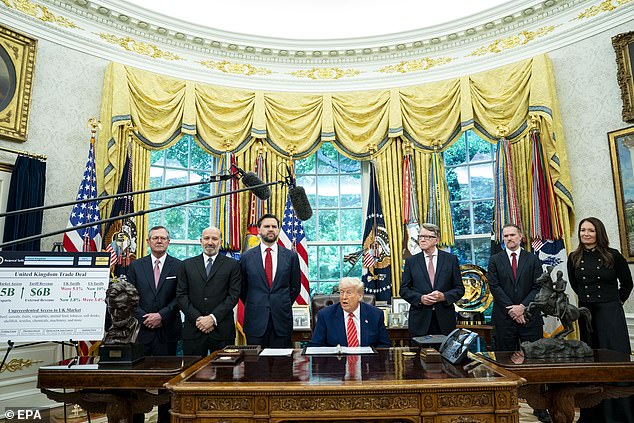
Mr Trump and his team lined up in the Oval Office with UK ambassador Lord Mandelson
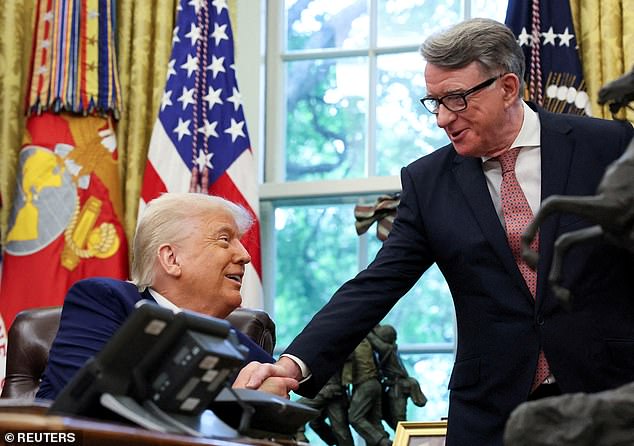
Mr Trump and Lord Mandelson shake hands in the White House last night
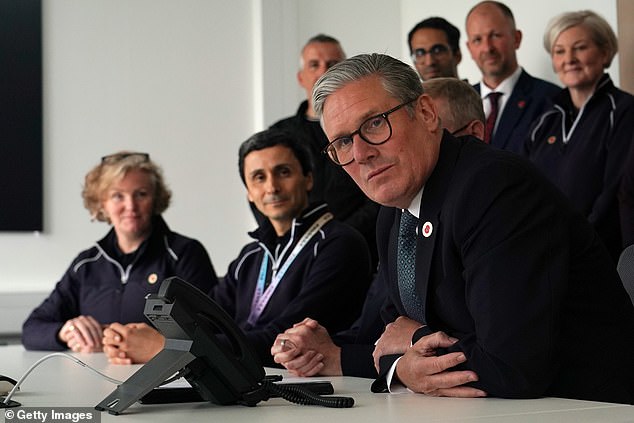
Sir Keir had a bizarre on-camera chat with Mr Trump as they finalised the terms
‘It’s not a trade agreement in the classic sense.’
Mr Griffith said the deal did not offer any mutual recognition between the US and UK and urged the Government to get back round the table with its counterparts to negotiate ‘a comprehensive agreement’.
But the PM said: ‘The question we should be asking is, is it a better position than we were in yesterday?’
He claimed the breakthrough vindicated his emollient approach to Mr Trump, adding: ‘My government has put Britain at the front of the queue because we want to work constructively with allies.’
Government sources acknowledged the deal falls short of a hoped-for agreement on lifting all US tariffs, but said ministers decided to press ahead with a partial deal now to prevent redundancies in the car industry.
Business secretary Jonathan Reynolds said the ‘significance of the US market’ to high-end exporters such as JLR, Aston Martin and Bentley meant the UK was facing the ‘imminent announcement’ of job losses if the 25 per cent tariff had remained.












